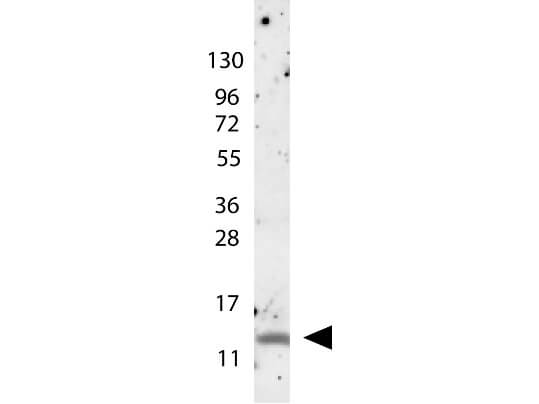Anti-Human MIP-1ß (RABBIT) Antibody
MIP-1 beta Antibody
- SPECIFICATION
- CITATIONS
- PROTOCOLS
- BACKGROUND

| Host | Rabbit |
|---|---|
| Conjugate | Unconjugated |
| Target Species | Human |
| Reactivity | Human |
| Clonality | Polyclonal |
Application
| WB, E, I, LCI |
| Application Note | This purified antibody has been tested in western blotting. Reactivity is also expected in ELISA, neutralizations, radioimmunoassay and immunohistochemistry. The endotoxin content is estimated to be <10 pg/ µl by the LAL method. By western blot a band approximately 15 kDa in size corresponding to native human MIP-1ß protein is expected in the appropriate cell lysate or extract. Specific conditions for reactivity should be optimized by the end user. |
| Physical State | Lyophilized |
| Buffer | 0.02 M Potassium Phosphate, 0.15 M Sodium Chloride, pH 7.2 |
| Immunogen | This purified antibody was prepared from whole rabbit serum produced by repeated immunizations with full length recombinant human MIP-1ß protein. |
| Reconstitution Volume | 100 µL |
| Reconstitution Buffer | Restore with deionized water (or equivalent) |
| Gene ID | 388372;6351 |
|---|---|
| Other Names | 6351 |
| Purity | This product is an IgG fraction antibody purified from monospecific antiserum by a multi-step process which includes delipidation, salt fractionation and ion exchange chromatography followed by extensive dialysis against the buffer stated above. This purified antibody has been heated to 56°C for 30 minutes. In ELISA and other immunoreactive assays, this antibody will recognize both native and recombinant human IL-9 in cell supernatants and certain body fluids. A control of similarly diluted normal rabbit IgG is recommended. |
| Storage Condition | Store vial at 4° C prior to restoration. For extended storage aliquot contents and freeze at -20° C or below. Avoid cycles of freezing and thawing. Centrifuge product if not completely clear after standing at room temperature. This product is stable for several weeks at 4° C as an undiluted liquid. Dilute only prior to immediate use. |
| Precautions Note | This product is for research use only and is not intended for therapeutic or diagnostic applications. |
| Name | CCL4 |
|---|---|
| Synonyms | LAG1, MIP1B, SCYA4 |
| Function | Monokine with inflammatory and chemokinetic properties. Binds to CCR5. One of the major HIV-suppressive factors produced by CD8+ T- cells. Recombinant MIP-1-beta induces a dose-dependent inhibition of different strains of HIV-1, HIV-2, and simian immunodeficiency virus (SIV). The processed form MIP-1-beta(3-69) retains the abilities to induce down-modulation of surface expression of the chemokine receptor CCR5 and to inhibit the CCR5-mediated entry of HIV-1 in T-cells. MIP-1- beta(3-69) is also a ligand for CCR1 and CCR2 isoform B. |
| Cellular Location | Secreted. |

Thousands of laboratories across the world have published research that depended on the performance of antibodies from Abcepta to advance their research. Check out links to articles that cite our products in major peer-reviewed journals, organized by research category.
info@abcepta.com, and receive a free "I Love Antibodies" mug.
Provided below are standard protocols that you may find useful for product applications.
Background
MIP1 alpha and MIP1 beta were originally co-purified from medium conditioned by an LPS-stimulated murine macrophage cell line. Human MIP1 beta refers to the products of several independently cloned cDNAs, including Act2, PAT 744, hH400, G26, HIMAP, HC21, and MAD 5a. The predicted protein products of these cDNAs represent variants that are between 94% - 98% identical and these proteins are all approximately 75% homologous to murine MIP1 beta. MIP1 beta also shares approximately 70% amino acid identity with MIP1 alpha. MIP1 proteins are expressed primarily in T cells, B cells, and monocytes after antigen or mitogen stimulation. The MIP1 proteins have chemoattractant and adhesive effects on lymphocytes, with MIP1 alpha and MIP1 beta preferentially attracting CD8+ and CD4+ T cells, respectively. A signal transducing receptor designated the CC chemokine receptor 1 (CC CKR1) with seven transmembrane domains that binds MIP1 alpha, MIP1 beta, MCP1 and RANTES with varying affinities has been isolated.
If you have used an Abcepta product and would like to share how it has performed, please click on the "Submit Review" button and provide the requested information. Our staff will examine and post your review and contact you if needed.
If you have any additional inquiries please email technical services at tech@abcepta.com.













 Foundational characteristics of cancer include proliferation, angiogenesis, migration, evasion of apoptosis, and cellular immortality. Find key markers for these cellular processes and antibodies to detect them.
Foundational characteristics of cancer include proliferation, angiogenesis, migration, evasion of apoptosis, and cellular immortality. Find key markers for these cellular processes and antibodies to detect them. The SUMOplot™ Analysis Program predicts and scores sumoylation sites in your protein. SUMOylation is a post-translational modification involved in various cellular processes, such as nuclear-cytosolic transport, transcriptional regulation, apoptosis, protein stability, response to stress, and progression through the cell cycle.
The SUMOplot™ Analysis Program predicts and scores sumoylation sites in your protein. SUMOylation is a post-translational modification involved in various cellular processes, such as nuclear-cytosolic transport, transcriptional regulation, apoptosis, protein stability, response to stress, and progression through the cell cycle. The Autophagy Receptor Motif Plotter predicts and scores autophagy receptor binding sites in your protein. Identifying proteins connected to this pathway is critical to understanding the role of autophagy in physiological as well as pathological processes such as development, differentiation, neurodegenerative diseases, stress, infection, and cancer.
The Autophagy Receptor Motif Plotter predicts and scores autophagy receptor binding sites in your protein. Identifying proteins connected to this pathway is critical to understanding the role of autophagy in physiological as well as pathological processes such as development, differentiation, neurodegenerative diseases, stress, infection, and cancer.


